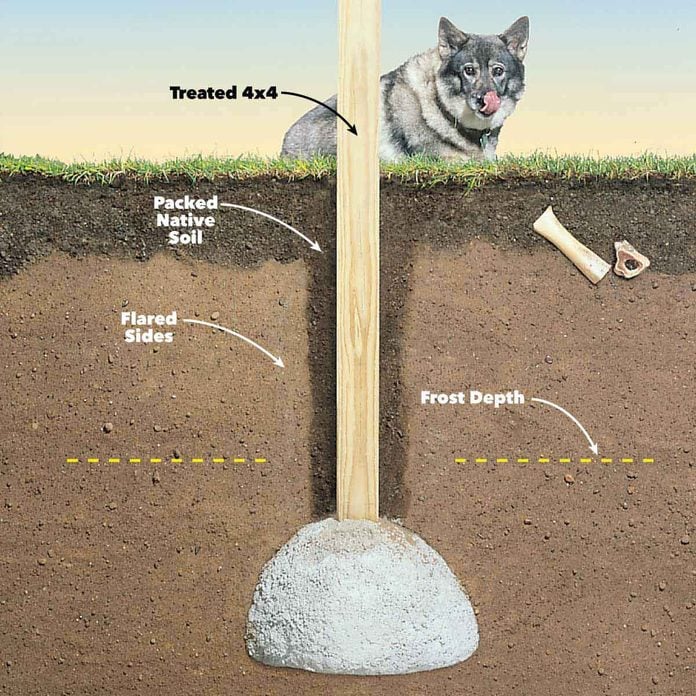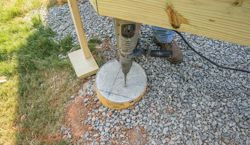Deck Footings 101: Navigating the Fundamentals for a Steady and Sturdy Deck
Deck Footings 101: Navigating the Fundamentals for a Steady and Sturdy Deck
Blog Article
Choosing the Right Deck Footings for Security and Sturdiness
When it involves constructing a deck, among one of the most essential choices you will make is selecting the right footings for security and durability. The longevity and security of your deck depend greatly on the sort of footings you pick, as they offer the crucial assistance and stability to withstand the examination of time. With a myriad of options offered, it can be overwhelming to identify which grounds are best matched for your certain demands. In this conversation, we will certainly discover the different kinds of deck footings, think about the essential variables to evaluate when choosing, and explore the benefits and drawbacks of various choices. By the end, you will certainly have a more clear understanding of the selections available and be far better furnished to make an informed decision for your deck task.
Kinds Of Deck Footings
These footings consist of a cylindrical hole filled with concrete, which provides a solid foundation for the deck posts. Concrete pier footings are relatively easy to install and provide outstanding security, making them a prominent option for lots of deck jobs.
These footings are installed by screwing them into the ground, which develops a protected foundation for the deck. They likewise enable for easy adjustment and progressing of the deck if required.
Additionally, some home builders select precast concrete footings. These grounds are constructed from resilient concrete and be available in different sizes and shapes to accommodate various deck styles. Precast concrete grounds are hassle-free to set up and provide a steady base for the deck structure.
Ultimately, another alternative is the post-in-anchor footing system. This kind of ground involves driving a steel anchor right into the ground and connecting it to the deck message. It offers adaptability in terms of placing the deck blog posts and is appropriate for decks with lightweight frameworks.
When selecting the best sort of deck ground, it is vital to consider variables such as soil conditions, deck lots, and regional building codes (Deck Footings). Consulting with an expert specialist or structural designer can assist make sure the suitable footing is selected for a stable and safe deck
Factors to Take Into Consideration When Choosing Grounds
When selecting the suitable grounds for a deck, it is essential to meticulously think about different variables such as soil conditions, deck tons, and adherence to neighborhood building regulations. These elements play a substantial role in guaranteeing the security and resilience of the deck framework.
The kind of dirt on which the deck will be built figures out the type of footings called for. On the various other hand, decks developed on clay or extensive soils may call for grounds that can suit the dirt's tendency to expand and contract.
An additional important variable is the deck lots. The weight of the deck, consisting of the materials utilized and any potential real-time lots such as furnishings or gatherings, need to be taken right into account when selecting grounds. The grounds should be designed to birth the weight of the deck and distribute it equally to protect against any type of structural issues or failings.
Lastly, adherence to neighborhood structure codes is critical. Building ordinance vary from area to region, and it is vital to follow the details demands set by the neighborhood authorities. Deck Footings. These codes make sure that the deck is developed safely and fulfills the required criteria for structural honesty and load-bearing capacity
Concrete Grounds: Pros and Cons

Concrete grounds supply several advantages and negative aspects when used as the foundation for a deck. On the silver lining, concrete footings supply excellent stability and longevity. Concrete is a strong and inflexible material that can support hefty tons and stand up to different climate condition. It also has a lengthy life expectancy, making it a dependable selection for long-lasting use.
One more benefit of concrete grounds is their convenience. They can be put into different sizes and shapes to fit various deck styles and setups. Concrete grounds can be personalized to fit the specific demands and needs of the deck framework.
Nevertheless, there are likewise some drawbacks to using concrete footings. One significant disadvantage is the price and labor involved in their installment. Concrete grounds need excavation and usually require the aid of hefty equipment. This can raise the total expense of the deck task and might need expert support.

Helical Piers Vs. Sonotubes: Which Is Better?
In considering the structure choices for a deck, the contrast between helical piers and sonotubes is vital in determining the remarkable choice. They are turned into the ground utilizing hydraulic equipment, offering a stable site and long lasting foundation for the deck.
The helical plates on the piers produce a strong grip with the dirt, shifting or preventing any kind of motion of the deck. Sonotubes, on the various other hand, rely solely on the concrete loading for stability, which may not offer the very same degree of stamina and resistance.
In regards to setup, helical piers are relatively less complicated and faster to set up contrasted to sonotubes. The hydraulic machinery made use of to twist the piers right into the ground guarantees a reliable and quick procedure. Sonotubes, on the various other hand, need excavating holes and putting concrete, which can be lengthy and labor-intensive.
Furthermore, helical piers are a more functional choice. If needed, they can be utilized in numerous soil conditions and can be readjusted or reinforced. Sonotubes, on the other hand, might call for additional support, such as rebar, in particular dirt conditions or locations with high load requirements.
Choosing the Right Footings for Your Deck's Measurements
For optimal architectural honesty, it is necessary to thoroughly pick the suitable grounds that straighten with the dimensions of your deck. The measurements of your deck, including its height, width, and size, play a significant function in figuring out the kind and size of footings required.
When choosing footings for your deck, it is crucial to take into consideration the load-bearing capacity of the soil. click over here The weight of the deck, integrated with the weight of any kind of furniture or people on it, puts in a substantial force on the grounds (Deck Footings). Consequently, it is important to select footings that can sufficiently support this weight without sinking or changing gradually.
Larger decks with better measurements need bigger grounds to supply adequate security and support. The shape of the grounds, whether they are round or square, depends on the design and format of the deck.
Final Thought
In final thought, picking the best deck grounds is essential for making certain security and longevity. Aspects such as the type of footings, the deck's measurements, and the pros and cons of different alternatives must be thought about.
These footings are composed of a round opening filled up with concrete, which supplies a solid foundation for the deck articles. Concrete pier grounds are fairly simple to install and offer exceptional stability, making them a popular selection for lots of deck jobs.
Precast concrete grounds are practical to set up and supply a secure base for the deck framework.
It supplies adaptability in terms of placing the deck blog posts and is directory ideal for decks with light-weight frameworks.
Concrete grounds supply numerous benefits and disadvantages when used as the foundation for a deck.
Report this page